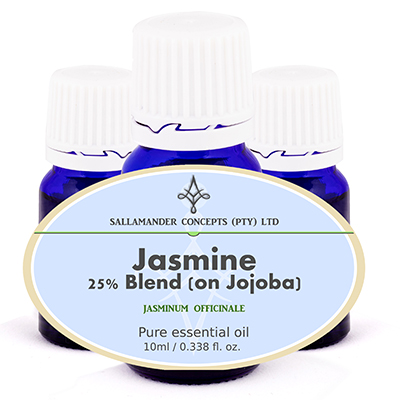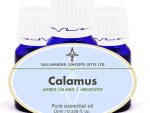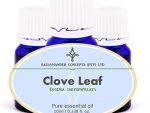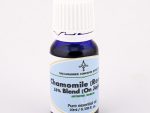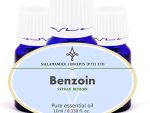Jasmine essential oil is very rare and is usually only used or created for specialized work in laboratories. Jasmine is most commonly found as an absolute though, and is blended with a carrier oil to make it more cost effective. Jasmine essential oil is extracted from Jasminum Gradiflorum (synonym officinale), of the Oleaceae family and is also known as jasmin, jessamine and common jasmine.
Although expensive, Jasmine Absolute blend does more than just smell exquisite – it deeply relaxes, lifts depression and boosts confidence, eases childbirth, helps with sexual problems, sooths coughing and tones and improves skin elasticity, while helping to reduce stretch marks and scars.
Our Joy spiritual oil blend to evoke feelings of joy is a blend of pure, mystical and ancient essential oil, contains Jasmine oil as it has anti-depressant qualities and lends its wonderful fragrance to the blend.
Oil Properties of Jasmine essential oil
Jasmine essential oil is really a blend of the Absolute that has a sweet, exotic and richly floral smell.
Origin of Jasmine essential oil
Jasmine is an evergreen, fragile, climbing shrub, that can grow up to 10 meters (33 feet) high and has dark green leaves and small white star-shaped flowers, which are picked at night, when the aroma is most intense.
An experienced picker can pick 10,000-15,000 blossoms per night.
Originally from China and Northern India, it was brought to Spain by the Moors, with France, Italy, Morocco, Egypt, China, Japan and Turkey currently producing the best absolute.
The name Jasmine is derived from the Persian word ‘yasmin’.
The Chinese, Arabians and Indians used it medicinally, as well as for an aphrodisiac and for other ceremonial purposes.
In Turkey, the wood is used for making rope stems and jasmine tea is a Chinese favorite (but Jasminum sambac – Arabian jasmine – is normally used for this) and in Indonesia it is used as a popular garnish.
You do not commonly find a Jasmine essential oil. Jasmine most usually starts it journey as a ‘concrete’, which is made by solvent extraction, after which an ‘absolute’ is obtained from the concrete, by separation with alcohol. You may rarely find jasmine essential oil in a laboratory, but the jasmine plant does not lead itself to extraction by diffusion.
Jasmine essential oil is really a very expensive absolute and will usually be sold as a blend, where a carrier oil is used to dilute the absolute to make the end product more affordable.
1,000 lbs of flowers yield approximately one pound of liquid concrete, which yields 0.2% aromatic molecules.
Chemical composition
some of the main chemical components found in Jasmine essential oil are: Benzyl acetate, Benzyl benzoate, Phytol, Squalene 2,3-oxide, Isophytol, Phytyl acetate, Linalool
Precautions when using Jasmine essential oil
Jasmine absolute (not Jasmine essential oil is this is extremely rare) is considered to have a moderate risk of causing skin sensitisation. IFRA recommends a maximum dilution rate of 0.7% of the absolute.
Jasmine blend should not be used on children under the age of 2 years (skin sensitivity).
Using too much of absolute could impede concentration, as it has a deeply relaxing effect.
Please read our page with heading: Safety with Essential Oils before using this oil.
We recommend the following book as an excellent resource regarding safety:
Essential Oil Safety: A Guide for Health Care Professionals by Robert Tisserand & Rodney Young (#ad)
Therapeutic properties
The therapeutic properties of jasmine essential oil (known as an essential oil but actually an absolute) are anti-depressant, antiseptic, aphrodisiac, anti-spasmodic, cicatrisant, expectorant, galactagogue, parturient, sedative and uterine.
Uses
Jasmine Absolute Oil Blend is not Jasmine essential oil, but is a 25% Absolute to 75% Jojoba oil blend that is a valuable remedy in cases of severe depression and soothes the nerves, producing a feeling of confidence, optimism and euphoria, while revitalizing and restoring energy.
Jasmine blend facilitates delivery in childbirth: it hastens the birth by strengthening the contractions and at the same time relieves pain. It is effective in post-natal depression and is said to promote the flow of breast milk.
Because of its deeply soothing and calming nature, jasmine oil helps with sexual problems such as impotence, premature ejaculation and frigidity.
It has a very beneficial effect on the respiratory system, by soothing irritating coughs and helping with hoarseness and laryngitis.
It helps with muscle pain, sprains, and stiff limbs.
Jasmine essential oil (actually a blend of Jasmine Absolute) blend tones dry, greasy, irritated and sensitive skin, increases elasticity and is often used to assist with stretch marks and to reduce scarring.
Burners and vaporizers
In vapor therapy, jasmine essential oil (really an absolute an not an essential oil) blend can be useful for treating addiction, lifting depression, easing nervousness, soothing coughs, promoting relaxation and easing tension.
Blended Massage Oil or in the Bath
Jasmine essential oil (actually an absolute) blend can be used as a blended massage oil or diluted in the bath, for helping to break addiction, lifting postnatal depression, promoting relaxation, easing muscle pain, soothing coughs, reducing tension, stress and nervousness.
Blended in a Cream
Jasmine oil blend can be used in a cream or lotion for dry, greasy or sensitive skin, as well as to help reduce stretch marks and other scars.
Suggested Dilution Rates (25% absolute on 75% Jojoba)
On the skin
Adult:
Face: 1% to 1.5%
Body: 1% to 2.5%
Bath: 1% to 2.5%
3 to 24 months:
Do not use this oil topically
2 to 6 years:
Face: 0.4 to 1%
Body: 0.4% to 1%
Bath: 0.4% to 1%
6 to 15 years
Face: 0.4% to 1.5%
Body: 0.4% to 2%
Bath: 0.4% to 2%
Pregnancy
Face: 0.5% to 1.5%
Body: 0.5% to 2.5%
Bath: 0.5% to 2.5%
- When in doubt consult your doctor / medical professional before use.
- Most professionals and/or Aromatherapists will always err on the side of safety when giving advice regarding the use of essential oils and oleo resins during pregnancy.
- Quite a number of Aromatherapists advise that you should avoid the topical use of all essential oils completely while pregnant, specifically during the first trimester. This is a very safe approach but may not be necessary at all.
Diffusers and Vaporisers
16 to 32 drops
General:
- When using for the first time – Always use the lowest dilution rate and build up slowly to the maximum. Stop using all essential oils on the skin if irritation or allergy occurs.
- Any advice or instruction received from a medical professional ALWAYS supersedes recommendations or advice found on this website. When in doubt consult your doctor / medical professional.
Summary
Jasmine absolute oil (not Jasmine essential oil) blend has great value for treating severe depression, eases childbirth, is beneficial with sexual problems, the respiratory tract, for muscle pain and for toning the skin. It should not be used topically on children 2 years old or younger. Jasmine absolute is regarded as a moderate skin sensitiser, but our blend is at a ratio of 3 parts Jojoba to 1 part Jasmine absolute, which means that you will have to use four times the amount to get the same effect.
Blends
Although essential oils blend well with most other oils, Jasmine oil blends particularly well with Bergamot, Rose, Sandalwood and all Citrus oils.

